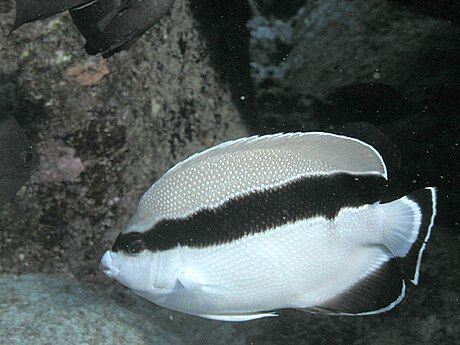The banded angelfish (Apolemichthys arcuatus), also known as the bandit angelfish and three spine angelfish, is a distinctive species ray-finned fish belonging to the family Pomacanthidae. It is endemic to deeper reefs in Hawaii and the Johnston Atoll.
| Banded angelfish | |
|---|---|
 | |
| Banded angelfish (Apolemichthys arcuatus ) | |
| Scientific classification | |
| Domain: | Eukaryota |
| Kingdom: | Animalia |
| Phylum: | Chordata |
| Class: | Actinopterygii |
| Order: | Perciformes |
| Family: | Pomacanthidae |
| Genus: | Apolemichthys |
| Species: | A. arcuatus |
| Binomial name | |
| Apolemichthys arcuatus (Gray, 1831) | |
| Synonyms[2] | |
| |
Description
The banded angelfish has an overall a pale white coloured body which is marked with a wide black band with a white upper margin that starts immediately above the mouth and runs to the posterior part of the dorsal fin. Another similar black white edged submarginal band runs along the caudal and anal fins. [3] The dorsal fin contains 13 spines and 17-18 soft rays while the anal fin has 3 spines and 18 soft rays. This species attains a maximum total length of 18 centimetres (7.1 in).[2]
Distribution
The banded angelfish is endemic to Hawaii and Johnston Atoll.[1]
Habitat and biology
The banded angelfish is a common species on rocky reefs, under overhangs and in caves, in areas of coral. Its diet is dominated by sponges but they also consume algae, hydroids and the eggs of marine organisms.[2] They are found at depths of 10 to 183 metres (33 to 600 ft). Juveniles are found in deeper water.[1]
Systematics
The banded angelfish was first formally described as Holacanthus arcuatus in 1831 by the English naturalist John Edward Gray (1800–1875).[4] Its specific name, arcuatus, means “bowed” or “arched”, a reference to the “broad black arched band from the eye to the caudal end of the dorsal fin”.[5]
Utilisation
The banded angelfish is rare in the aquarium trade and when available it is a difficult species to maintain in captivity.[3]
References
Wikiwand in your browser!
Seamless Wikipedia browsing. On steroids.
Every time you click a link to Wikipedia, Wiktionary or Wikiquote in your browser's search results, it will show the modern Wikiwand interface.
Wikiwand extension is a five stars, simple, with minimum permission required to keep your browsing private, safe and transparent.

